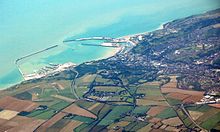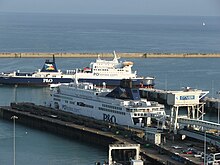Dover
Dover is a town on the coast in Kent, in the United Kingdom. It was built by the Romans. There is a castle in Dover, called Dover Castle. It is the largest castle in England. The population is about 39,078. Throughout history, it has been an important port of Britain because it is the closest port to mainland Europe. The sea between Dover and the French port of Calais is called the Strait of Dover. It is the narrowest part of the English Channel at only 34 kilometres (21 mi) wide.


The ferry port in Dover has ferries to Calais, France and Ostende, Belgium. Almost 45,000 people and 15,000 vehicles pass through the port every day. On of the largest tourist attractions around Dover are the White Cliffs of Dover.
Dover District Council is responsible for checking food for diseases when it comes through the port.[1]
Dover History
changeThe Romans first tried to invade Dover in 55BC, under Julius Caesar. They were forced back by the Celts, who fiercely defended the coastline. It was not until 43 AD, under the rule of Emperor Claudius, that Roman forces landed on British soil at Richborough and took control of the land as far as the northern border. Dover, then called DVBRIS, became the Romans' most important naval town.
Gallery
change-
Beach and castle
-
Church of "St Mary in Castro" and the Roman Lighthouse
-
Dover Castle
-
White Cliffs of Dover
-
Panorama of the port
Other websites
change- A History of Dover Archived 2006-10-20 at the Wayback Machine
- The History of Dover Castle
- Dover Castle information Archived 2011-08-10 at the Wayback Machine
References
change- ↑ "Dover Council at risk of bankruptcy over food import checks". BBC News. 2024-02-06. Retrieved 2024-02-08.